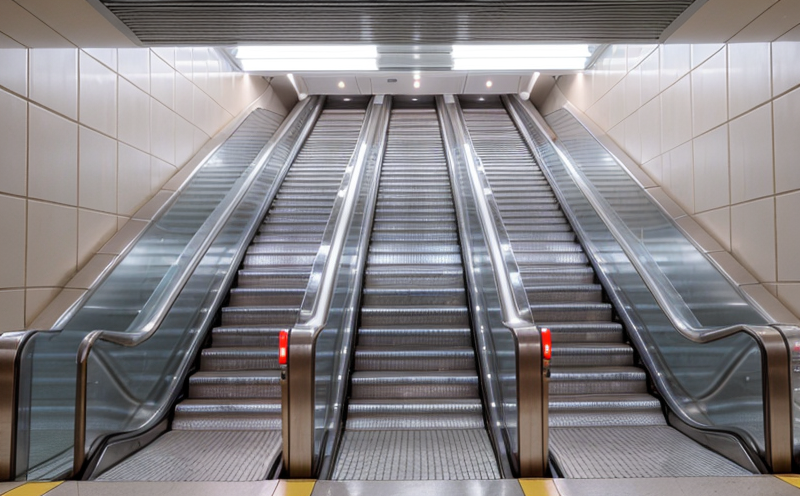Escalator emergency stop inspection
The escalator emergency stop inspection is a critical procedure that ensures the safety and functionality of an elevator or escalator system. This inspection focuses on evaluating the performance of the emergency stop feature, which plays a pivotal role in safeguarding passengers during unexpected situations. The primary goal of this test is to verify that the emergency stop function operates seamlessly under various conditions and adheres to international standards such as ISO 21796-1 for escalators.
The inspection process involves a series of steps designed to ensure that the emergency stop function is reliable and effective. Initially, the inspector will review the installation documentation provided by the manufacturer. This documentation includes details about the design and operation of the safety systems, including the emergency stop feature. Afterward, the inspector proceeds to perform the actual test by simulating various emergency scenarios.
During these simulations, the inspector checks if the emergency stop function operates correctly under different conditions such as sudden changes in load or speed variations. The inspector will also verify that the safety devices function properly and can halt the escalator immediately when required. This includes testing the tactile feedback provided to passengers, which is crucial for ensuring they are aware of an impending emergency.
The inspection process not only evaluates the mechanical components but also assesses the electrical systems involved in the emergency stop mechanism. The inspector uses specialized equipment such as multimeters and oscilloscopes to measure voltage levels and signal integrity within these systems. Additionally, the inspector checks for any signs of wear or damage that could compromise the reliability of the emergency stop function.
Once all tests are completed, the inspector prepares a detailed report outlining the findings from the inspection. This report serves as documentation for compliance with relevant standards and regulations. It also highlights any areas where improvements can be made to enhance safety measures further. For organizations responsible for public transportation facilities or commercial properties, this document provides essential evidence of adherence to industry best practices.
By conducting regular escalator emergency stop inspections, facility managers ensure that their systems meet the highest levels of safety and reliability standards. Such inspections play a crucial role in preventing accidents and protecting both passengers and staff members who use these facilities daily.
Why It Matters
The importance of performing regular escalator emergency stop inspections cannot be overstated, especially given the increasing number of people relying on elevators and escalators in public spaces. These devices are essential components of modern infrastructure, providing mobility for individuals with disabilities and facilitating efficient movement through crowded areas.
However, like any mechanical device, escalators require maintenance to ensure they function safely over extended periods. An effective emergency stop system is one aspect that contributes significantly to overall safety; however, it must work consistently without fail during critical moments when passengers' lives are at risk.
- Reduces Risk of Accidents: Properly functioning emergency stops can prevent accidents caused by unexpected failures or malfunctions. Regular inspections help identify potential issues early on before they escalate into serious incidents.
- Promotes Compliance: Many countries mandate periodic testing and certification for elevators and escalators to guarantee public safety. Performing these tests ensures compliance with local laws and regulations, thereby avoiding penalties or fines associated with non-compliance.
- Enhances Reputation: Demonstrating a commitment to safety through regular inspections builds trust among stakeholders including employees, customers, and regulatory bodies. A strong reputation can lead to increased business opportunities and improved customer satisfaction.
Why Choose This Test
There are several compelling reasons why organizations should prioritize choosing the escalator emergency stop inspection service:
- Comprehensive Evaluation: Our team conducts thorough evaluations covering all aspects of the emergency stop feature, ensuring no detail is overlooked.
- Expertise and Experience: Leveraging our extensive experience in elevator and escalator inspections allows us to provide accurate assessments tailored specifically for your unique needs.
- Compliance Assurance: By adhering strictly to international standards like ISO 21796-1, we ensure that every aspect of the inspection aligns with global best practices.
We understand that safety is paramount when it comes to elevators and escalators. Our rigorous testing procedures and experienced professionals guarantee peace of mind knowing your systems are fully functional and compliant.
Competitive Advantage and Market Impact
In today’s competitive business environment, maintaining a safe working environment is not just a necessity but also an opportunity to stand out. By investing in regular escalator emergency stop inspections, companies can secure several advantages:
- Increased Customer Confidence: Demonstrating a proactive approach towards ensuring passenger safety fosters trust and loyalty among customers.
- Elevated Reputation: A reputation for prioritizing employee and visitor safety enhances overall brand image, making your company more attractive to potential clients.
- Avoidance of Legal Issues: Ensuring compliance with relevant regulations helps avoid costly lawsuits or fines related to accidents involving elevators/escalators.
Moreover, such investments contribute positively towards sustainability initiatives by reducing energy consumption through optimized operation. These benefits ultimately translate into cost savings and improved operational efficiency for your organization.





